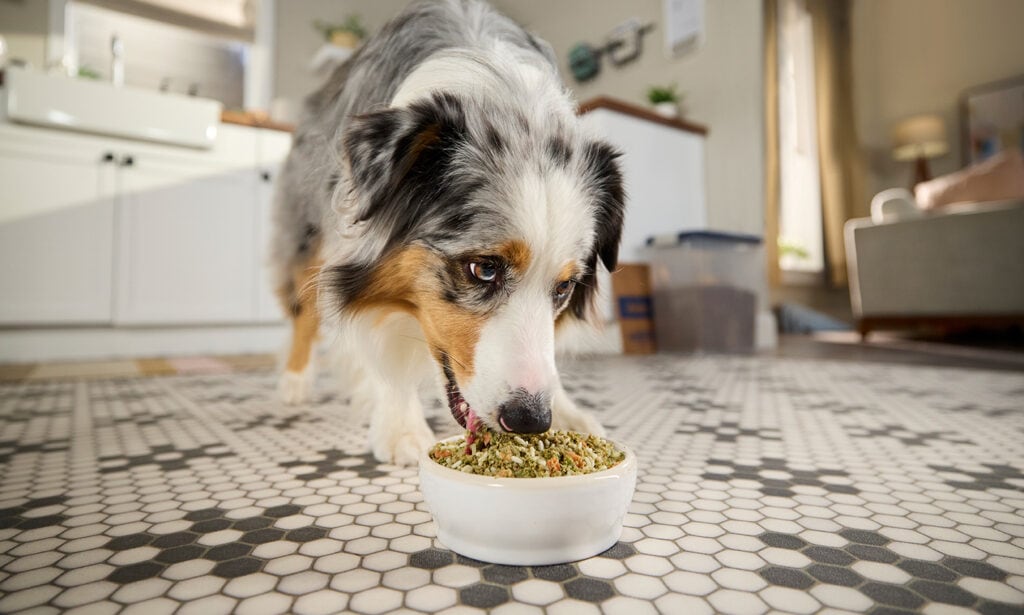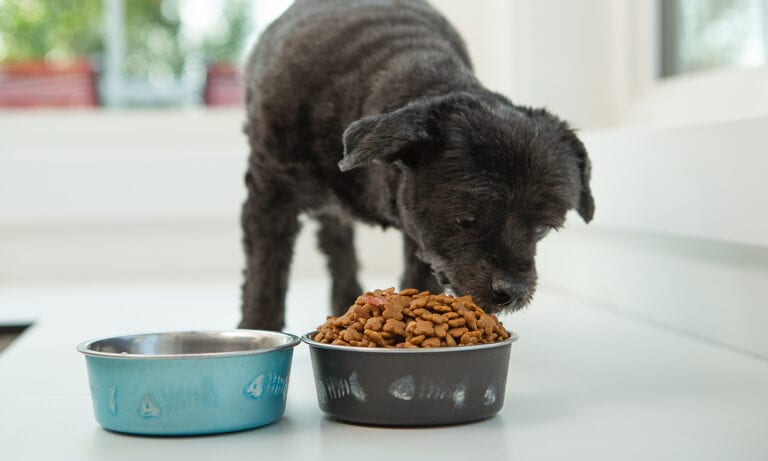Pet parents have many choices when picking out dog food. One alternative to commercial dog food pet parents might consider is homemade dog food, but is this a safe option? Do vets recommend feeding dogs homemade dog food?
Here’s what you should know about homemade dog food.
Consult with your vet before changing your dog’s diet.
In This Guide:
What Is Homemade Dog Food?
Homemade food for dogs usually involves cooking up commonly available ingredients (chicken, potatoes, green beans, and vegetable oil, for example) and then mixing in a vitamin and mineral supplement. The aim is to create a complete and balanced meal for dogs.
Preparing a complete and balanced, nutritious, homemade pet diet is actually very difficult, and if the diet is not balanced or does not meet the dog’s nutritional needs, they can become very sick and develop deficiencies.
It’s important to ensure your dog gets just the right amounts and types of protein, fat, carbohydrates, vitamins, and minerals.
Should I Feed My Dog Homemade Food?
For most dogs, any potential benefits of feeding homemade dog food are overshadowed by substantial risks, which include:
- Nutrient deficiencies or excesses that can lead to serious health problems: For instance, not enough vitamin D can make a dog’s bones soft, but too much can lead to calcium deposits in their soft tissues.
- Toxic ingredients: It’s possible to accidentally include an ingredient, such as onion or garlic, that is toxic for dogs.
- Exposure to potential pathogens, such as E. coli or salmonella: This can happen if ingredients aren’t cooked properly.
Plus, homemade dog foods can be expensive and time-consuming to prepare.
Homemade food for dogs can have some benefits, though, including the following:
- Pet parents can avoid ingredients they don’t like or that their dogs are allergic or sensitive to. However, there are now many commercially available diets from reputable veterinary brands that can address food allergies or sensitivities.
- Dogs often love the taste of homemade dog food, so pet parents may feel they need to take this step to help encourage their pup’s appetite.
However, commercial fresh dog foods, such as JustFoodForDogs, and veterinary diets, such as Hill’s, Purina, and Royal Canin, are also available and can meet these same needs.
Do Vets Recommend Homemade Dog Food?
Many veterinarians, veterinary nutritionists, and animal and human health organizations recommend against feeding a homemade dog food diet—and research backs them up.
Studies have shown that homemade dog food rarely provides complete and balanced nutrition, including:
- A 2019 study, where 84% of the diets had three or more nutrients below recommended levels
- A 2013 study, where 95% of the diets were deficient in at least one essential nutrient
And the problems don’t end there.
Even if you’re working from a recipe that, on paper, should provide your dog with good nutrition, it’s very easy to end up with food in the bowl that doesn’t.
In a 2014 study in which veterinary nutritionists prescribed 59 dogs nutritionally complete and balanced homemade diets, around 30% of pet parents admitted to changing the recipe, 40% failed to control the amount of the ingredients they used, and more than 70% didn’t use the recommended amount of oil and salt.
More than a quarter didn’t include necessary supplements at all.
What Should a Dog’s Diet Consist Of?
A nutritionally complete and balanced dog food must provide five types of nutrients:
- Carbohydrates: These are an excellent source of readily available energy for dogs.
- Proteins: These are required to make and maintain muscle, skin, fur, nails, tendons, ligaments, cartilage, enzymes, hormones, antibodies, and more.
- Fats: The most energy-dense nutrient, these also supply essential fatty acids and play a part in many body functions (conducting nerve impulses, for example).
- Vitamins: Most have enzymatic functions that are necessary for normal metabolism.
- Minerals: These play a structural role (calcium in bones, for example) or take part in metabolic processes.
It’s hard to get the amounts and ratios of all the required vitamins, minerals, fats, proteins, and carbs right in a homemade dog food, but pet parents can pick from lots of great commercial dry dog foods and wet dog foods that provide optimal nutrition for dogs, including:
What’s the Safest Way To Feed Homemade Dog Food?
Pet parents who decide to feed homemade dog food need to take special precautions.
First, speak to your veterinarian. They will probably recommend you bring your dog in for a health assessment at least twice a year to monitor for nutrition-related health problems and to review your dog’s diet.
Your vet can also refer you to a veterinary nutritionist who can provide you with nutritionally complete homemade dog food recipes that are appropriate for your dog’s age, health, and lifestyle.
You can also find vet-approved homemade dog food recipes through the American College of Veterinary Internal Medicine (ACVIM) and the online services PetDiets.com and Balance.it.
FAQs About Homemade Dog Food
Q:Is homemade food better for dogs?
A:No, homemade food is not better for most dogs. A high-quality commercial dog food that provides complete and balanced nutrition is usually the best option.
Q:What is the best homemade food to feed a dog?
A:Homemade dog food that is made from a recipe designed by a veterinary nutritionist based on a dog’s age, health, and lifestyle can provide good nutrition—as long as you follow the recipe exactly with precise amounts and don’t make any substitutions, add anything extra, or leave anything out.
Q:What do vets say about homemade dog food?
A:Homemade foods for dogs often have nutrient deficiencies or excesses that can make dogs sick. Most veterinary and human health organizations recommend against feeding homemade dog food, including:
Q:What should the top three ingredients be in dog food?
A:Dog food must provide appropriate types and amounts of proteins, fats, carbohydrates, vitamins, and minerals.
This content was medically reviewed by Veronica Higgs, DVM, Chewy veterinarian.
Share:













